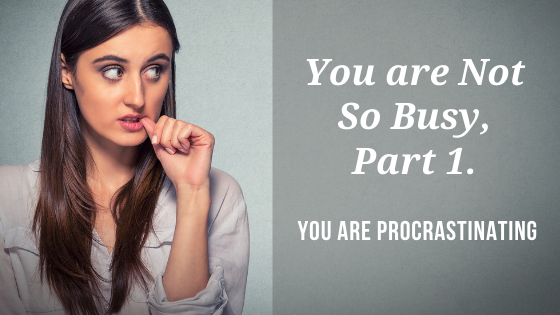21 de October, 2019

Last week, while reaching for a piece of paper to write a number down, I picked up a sealed envelope—it was an old water bill. I moved to another stack of papers only to realize it was just more mail. By then, I forgot the florist’s phone number that my sister had dictated to me a minute ago. Surrounded by little stacks of bills, magazines, and cards, I thought to myself, “I really need to organize my mail! I have to start using the color-coded filing cabinet I put together last year! I have just been so busy…”
Am I really that busy? I certainly feel frantic moving from one project and chore to the next until the day ends. But, I am not SO busy. I know plenty of industrious people with uncluttered countertops and organized mail. I just need to stop procrastinating.
If you, like me, have been having trouble with procrastination—whether you have had a blank Word screen up for 4 hours or have been avoiding the dentist for 5 years—it is necessary to understand, assess, and tackle the problem now.
What is procrastination and why do we procrastinate?
A 2013 study by Dr. Timothy Pychyl and Dr. Fuschia Sirois found that procrastination is not a time management problem, it is an emotional regulation problem. In their own words, “procrastination has a great deal to do with short-term mood repair and emotion regulation.”
Simply put, the reason I do not organize my mail is because I’d rather do anything else. And my brain loves me so much, it gives me a gazillion and one excuses to not do tasks I dislike. My mind insists that I use my time for more pleasurable past-times: “Why not peruse social media or eat another snack?”
Procrastination is a coping mechanism for anxiety, stress, and other negative feelings. The irony is, of course, that the more we procrastinate the more anxiety, stress, and negative emotions we feel.
How do I stop procrastinating?
Still so busy?
Please share in the comments your best tips and tricks to combat procrastination. And stick around for next week’s blog, You Are Not So Busy, Part 2: You Have Priorities.
____________________________________________________________
Do you feel stuck or anxious about the future? Do you feel it’s time to take a leap to keep growing in your career or business? No matter your situation, this free guide will walk you through my coaching process to get you moving and making progress. Get your copy now!
¿Te resulto informativo? Síguenos en @icatalyze para más contenido como este.

In the world of business (regardless of size), crises are inevitable. From economic uncertainty to abrupt market changes, organizations face challenges that can profoundly affect the emotional health of their teams. A striking statistic from the American Psychological Association (APA) reveals that 77% of employees in the United States reported work-related stress in the past […]
Ver más »
“71% of employers value emotional intelligence more than technical skills when evaluating candidates,” according to a 2024 Harvard Business School article titled: Why Emotional Intelligence is Important in Leadership. Diane Garza, iCatalyze CEO, states that “Today, companies face a significant challenge: high talent turnover, especially among new generations like millennials and Gen Z. These […]
Ver más »
This article was originally published in Spanish on Entrepreneur.com. Read the original version HERE. At the heart of effective leadership lies the ability to delegate efficiently. Delegation is not only crucial for time management and operational efficiency, but it is also fundamental for team empowerment and development. However, the real challenge for many leaders is […]
Ver más »